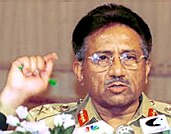And so no one can acknowledge that the national interest of United States sometimes requires it to do business with dictators. We have to pretty them up as our “friends”, and George W. Bush has refined this art, lionizing all the petty thugs that prudence requires him to ally with as “America’s good friend”, or “a great friend in the War on Terror”, or — God help us all — “a friend of Freedom”.
 Which brings us to General Syed Pervez Musharraf. On September 10th, 2001, this stalwart friend of the United States was anathema. Under his aegis Pakistan’s ISI had nurtured, brought to power, and maintained the Taliban in power in neighboring Afghanistan. The brutes in Kabul were Musharraf’s and Pakistan’s little Islamist hobby, a way to allow those boisterous military types in the ISI to get their jollies without upsetting the applecart back in Islamabad. Add the Islamic Bomb to the equation, and Pakistan could only be consigned to the Outer Darkness of our foreign policy.
Which brings us to General Syed Pervez Musharraf. On September 10th, 2001, this stalwart friend of the United States was anathema. Under his aegis Pakistan’s ISI had nurtured, brought to power, and maintained the Taliban in power in neighboring Afghanistan. The brutes in Kabul were Musharraf’s and Pakistan’s little Islamist hobby, a way to allow those boisterous military types in the ISI to get their jollies without upsetting the applecart back in Islamabad. Add the Islamic Bomb to the equation, and Pakistan could only be consigned to the Outer Darkness of our foreign policy.On the bright morning of the following day, though, everything changed. Mushy got a little dose of the carrot and a little dose of the stick, and overnight became a zealous ally in the War on Terror.
But General Musharraf is not all that different from some of the other Third World Dictators who receive quite different treatment at the hands of the Great Satan.
Gates of Vienna commenter Prashanth pointed us to this post by Nitin Pai in The Acorn, a member blog at The Indian National Interest:
Saddam Hussein got death, because he fell foul of the United States, lost a war, got caught, stayed alive through the legal proceedings wearing a natty suit and a personality that alarmed Iraq’s newly installed rulers. Gen. Musharraf gets dinner at the White House because he knows what’s good for him (down to the bit about proper attire).
He’s got a good point there.
- - - - - - - - - -
So what does Mushy have that Saddam didn’t have? More brains? Hardly. Saddam was brilliant in his evil, a shrewd and clever strategist. He stayed alive and in power for thirty-five years in the most brutal and lethal political environment on earth. Saddam was no dummy; it must have been something else.
 Look at it this way: suppose A. Q. Khan had done his work a little faster, or imagine that the DPRK and Saddam had been able to work out a mutually acceptable deal back in the 1990s. Pretend that when March 2003 rolled around, Saddam had a dozen or so Scud-B missiles tipped with 20-kiloton nuclear warheads, warheads that he could lob into Tel Aviv, Incirlik, or Kuwait, or at the U.S. fleet in the Persian Gulf.
Look at it this way: suppose A. Q. Khan had done his work a little faster, or imagine that the DPRK and Saddam had been able to work out a mutually acceptable deal back in the 1990s. Pretend that when March 2003 rolled around, Saddam had a dozen or so Scud-B missiles tipped with 20-kiloton nuclear warheads, warheads that he could lob into Tel Aviv, Incirlik, or Kuwait, or at the U.S. fleet in the Persian Gulf.Would the Marines have made the long march up to Baghdad anyway? Would the statues in the squares have still been toppled?
Or would Saddam now be sitting next to our President, wearing his dinner jacket and smiling for the photo op? Would he be lionized as a “true friend in the War on Terror”?
It’s worth thinking about.
The Acorn continues:
The most that can be said about hanging dictators and heads of state is that it serves to deter others. The clever ones know that that’s not true either. The real message is “unless you have one of the permanent members of the UN Security Council backing you, don’t mess with America”. The clever ones get it.
But, to be completely accurate, Nitin Pai should have added a clause: “unless you have one of the permanent members of the UN Security Council backing you, or an arsenal of nuclear weapons”.
Tehran gets it.

6 comments:
I would definitely not sell the General a life insurance policy. No doubt he is a complete no-goodnik, but he is occasionally useful, and I find dealing with his ilk somewhat preferable to the party bosses/quasi Western kleptocrats Pakistan seems to throw up as its alternative to generals.
I like Musharraf, he's a master at playing the western media and comes across as very affable. His chat with Jon Stewart was hilarious. I particularly loved his talk about when the US threatened Pakistan after 9/11, his staff wargamed through Pakistan vs the USA, and decided to cooperate... It was brilliant, and must have played well in Karachi.
OTOH, Pakistan is sheltering Al Qaeda and the Taleban. The anti-Islamist campaign is half-hearted at best. Our Saudi friends are pouring money into radicalising Pakistan; indeed I'd say that both our allies Pakistan & Saudi Arabia are a greater threat to the West than is Iran; Iran is mostly a threat to Saudi Arabia.
Americans have no colonial experience - when you do not have the resources to dominate a country like India you need to find allies and cut deals. That's how The East India Company did it..............if you do not have aircraft and ships and tanks abvailable but must still get results, you carve along the grain and not across it.
The trouble in Cambodia just as in Iraq was that the British were under-resourced and had to cut deals with local sheikhs which is why they have big ribal problems in Basra; and Bremer went beserk in Baghdad and declared himself Emperor and sent the Iraqi Army home to gear up for combat against the invader.
"OTOH over in Iran we have a rotting
crust sitting atop a population that is not so primitive, not so hostile to America.
Seems to me, as a long term matter,
we need to reassess and shift our policy towards both nations. Iran as a natural ally, Pakistan as a natural foe."
That's certainly my impression, but I'm pretty used to getting ignored on this. People tend to forget that the Iranian Revolution was in large part facilitated by the existence of a large 'modern' middle class in Tehran, who had absorbed the same Marxist claptrap that's currently devastating Europe. The thing about Pakistan's primitive state is not so much that that makes it a natural enemy; rather that it makes Pakistan very vulnerable to subversion by smarter and better educated Saudi Islamists, part of a deliberate Saudi government policy. I think most westerners don't realise the depth to which the House of Saud is hated in the Muslim world, and how the Saudis seek to counter this by funding the most radical Islamists to turn that hatred away from the Saudis and towards the US & Israel. I reckon Saudi influence may also explain why every Iranian conciliatory gesture towards the US has been rejected, as happened after 9/11. The other reason is that US govts are famous for holding grudges, and the Iranian hostage crisis still rankles.
It is worth remembering that Pakistan is a Muslim settlement on Indian Territory created by an Act of Parliament in London in 1947..............it came originally in two halves until India turned East Pakistan into Bangladesh in 1971
but it was Muslim invaders who swept into India
Great blog Baron!
Post a Comment